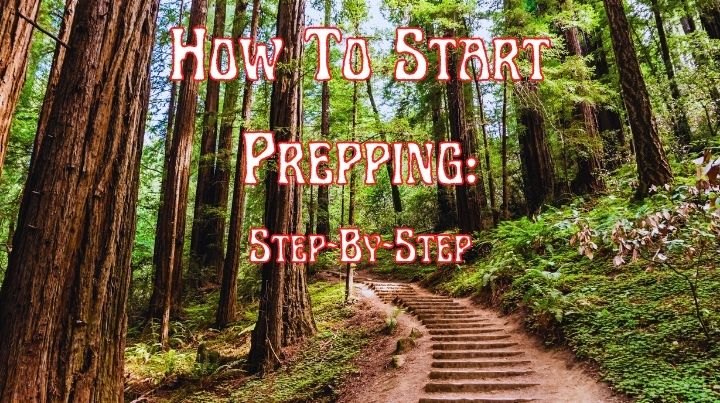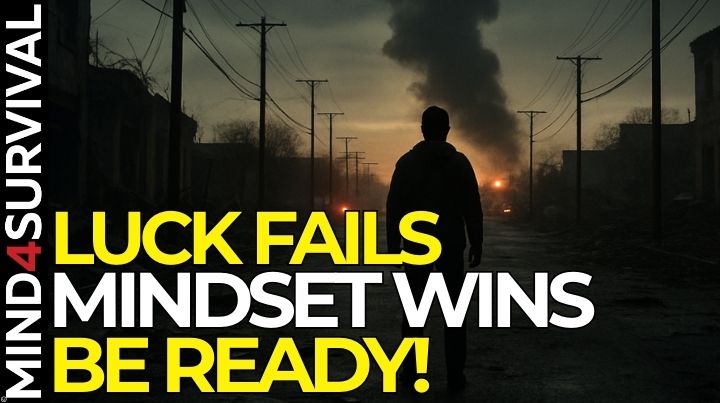How to Start Prepping Step by Step

One of the most common questions I get asked is how to start prepping. It is an important question because disaster can strike anywhere and at any time. And the answer is even more important. The way you explain how to start prepping can either sound achievable or overwhelming. One answer sets people on the path to preparedness, while the other answer deters them.
Whether it is a natural or human-made disaster, everyone should be prepared for the worst. As Zig Ziglar stated, “Expect the best. Prepare for the worst. Capitalize on what comes.”
So let's break how to start prepping down, step by step.
Step 1: What Do You Have to Protect?
The first step when deciding how to start prepping is to identify what you’re protecting. You may be protecting your family, friends, home, supplies, business, a combination of them all, or something else entirely.
Whatever it is, protecting that is now your mission.
Step 2: What Do You Have to Protect It From?
With step one decided upon, you now need to know what you’re protecting it from to figure out how to start prepping for it. Disasters, both human-made and natural, take on many different forms. You'll want to consider what problem you are most likely to encounter. If you live in the mountains, it’s doubtful you’ll experience a major hurricane. However, you may experience floods, blizzards, or wildfires.
Don’t also forget to incorporate human-made disasters. Economic downturns, terrorism, and other such events, while not from Mother Nature, can be incredibly disastrous. One only needs to read the government’s report on EMPs to understand how terrible human-made events can be.
Don't get tunnel vision focusing on less likely events.
While the big events, such as EMPs, are more “glamorous” to plan for, they are not the norm. Normal events are lesser in scope but can be impactful events that are more likely to happen. For example, losing your car to a 100-year flood has the same effect as losing it to a thief. Which one is more likely?
Step 3: What Will You Use to Protect It?
Now, you’ll need to identify what means you'll use to protect it.
So, for example, if you’re protecting your home from thieves, this will require you to assess your situation and formulate possible scenarios with appropriate responses. You may decide to install an alarm, get a dog, and/or beef up your defensive skills.
As you go through this process for each person, place, or thing you wish to protect, you’ll determine if you have what is needed to respond to the threat.
Step 4: Create Your Plan
Once you have the first three steps figured out, you’ll be able to develop your plan. One obvious fact is that it’s important to make your plan before you need it. Planning after the fact does little good for you or your family.
Know What You’re Planning For: Before planning, you will need to have a general idea of what you are planning for. That’s where the first three steps come in. With that general idea in place, you have an understanding of your plan’s requirements.
Fill in Your Plan: With that understanding, you will need to gather any additional information relevant to your plan. Ask yourself questions like the following:
- How many people are we planning for in the event of an emergency?
- Do we have any medical or mobility issues that might affect our plan?
- Do we have food storage and a way to cook it if the power goes out?
- Do we have a backup source of heat?
- Do we have a safe, secondary location?
- How will we get there?
Obviously, these questions are just starting points, but they'll give you an idea of what to consider.
Once that information is ready, you’ll be able to fill in the holes of your plan. Then gradually, your preparedness plan will take shape. As it does, you’ll continue to identify and address any other issues you identify along the way.
Step 5: Review Your Plan
Now that your plan is ready, review it. You may discover you've overlooked a few things. Don't worry! It's better to discover that now than when you're relying on your plan.
Check Your Plan: Look for areas that may not make sense, which may be confusing or ineffective. Revisit the aspects that you identify and take a swipe at revising them.
Bring in Others: After you go over it a few times, your plan should be fairly solid and ready for others you trust to review too. Have them check out your plan and provide constructive feedback. Discussing and debating the plan and potential options together is a great way to improve it.
Have a Realistic Point of View: When scrutinizing the plan, make sure you do so from a realistic perspective. Far too often, we believe that something will happen in a specific way, regardless of the situation. The truth is, you need to expect the unexpected and prepare for the impossible.
Do Not Assume Anything: You should make no assumptions about the capabilities or limitations of the risks you are facing. A bad guy can scale the wall you thought impossible. A fire can jump the break you cut and thought was wide enough. Remember, Murphy is always waiting to jack you up! So, please don’t assume your situation will always unfold the way you think it will.
The Bottom Line on How to Start Prepping
Most importantly, don't let yourself get overwhelmed when you think about how to start prepping. There are many simple ideas for getting started, and a lot of them are free or inexpensive. You may find that you already have much of what you need already on hand.
By just getting started and developing a plan, you're already way ahead of the crowd.
Do you have any questions about how to start prepping? For those of you who have been at it for a while, pop your best piece of advice for newbies in the comments section.
Additional Resources:
Stay safe,

Related Articles
FREE Guide
Read the Best Seller
Join Mind4Survival
Stay informed by joining the Mind4Survival! 100% Secure! 0% Spam!
Affiliate Disclosure...
Mind4Survival is a free, reader-supported information resource. If you make a purchase through our link, we may, at no cost to you, receive an affiliate commission.
Do You Want To Be Ready No Matter What?

Download our free 39-page guide with interactive, 7-Day Emergency Kit Checklist and take the first step toward real preparedness.
- Know exactly where to start.
- Save time and money.
- How-to build a complete Basic Emergency Kit.
- Level up your safety and security.
Join Mind4Survival
Stay informed by joining the Mind4Survival! 100% Secure! 0% Spam!





